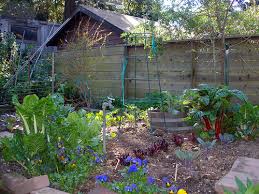If you still aren’t convinced, consider these benefits of backyard gardening:
Improve your family’s health. Eating more fresh fruits and vegetables is one of the most important things you and your family can do to stay healthy. When they’re growing in your backyard, you won’t be able to resist them, and their vitamin content will be at their highest levels as you bite into them straight from the garden. Parents, take note: A study published in the Journal of the American Dietetic Association found that preschool children who were almost always served homegrown produce were more than twice as likely to eat five servings of fruits and vegetables a day—and to like them more—than kids who rarely or never ate homegrown produce.
Save money on groceries. Your grocery bill will shrink as you begin to stock your pantry with fresh produce from your backyard. A packet of seeds can cost less than a dollar, and if you buy heirloom, non-hybrid species, you can save the seeds from the best producers, dry them, and use them next year. If you learn to dry, can, or otherwise preserve your summer or fall harvest, you’ll be able to feed yourself even when the growing season is over.
Reduce your environmental impact. Backyard gardening helps the planet in many ways. If you grow your food organically, without pesticides and herbicides, you’ll spare the earth the burden of unnecessary air and water pollution, for example. You’ll also reduce the use of fossil fuels and the resulting pollution that comes from the transport of fresh produce from all over the world (in planes and refrigerated trucks) to your supermarket.
Get outdoor exercise. Planting, weeding, watering, and harvesting add purposeful physical activity to your day. If you have kids, they can join in, too. Be sure to lift heavy objects properly, and to stretch your tight muscles before and after strenuous activity. Gardening is also a way to relax, de-stress, center your mind, and get fresh air and sunshine.
Enjoy better-tasting food. Fresh food is the best food! How long has the food on your supermarket shelf been there? How long did it travel from the farm to your table? Comparing the flavor of a homegrown tomato with the taste of a store-bought one is like comparing apples to wallpaper paste. If it tastes better, you’ll be more likely to eat the healthy, fresh produce that you know your body needs.
Build a sense of pride. Watching a seed blossom under your care to become food on your and your family’s plates is gratifying. Growing your own food is one of the most purposeful and important things a human can do—it’s work that directly helps you thrive, nourish your family, and maintain your health. Caring for your plants and waiting as they blossom and “fruit” before your eyes is an amazing sense of accomplishment!
Stop worrying about food safety. With recalls on peanut butter, spinach, tomatoes and more, many people are concerned about food safety in our global food marketplace. When you responsibly grow your own food, you don’t have to worry about contamination that may occur at the farm, manufacturing plant, or transportation process. This means that when the whole world is avoiding tomatoes, for example, you don’t have to go without—you can trust that your food is safe and healthy to eat.
Reduce food waste. Americans throw away about $600 worth of food each year! It’s a lot easier to toss a moldy orange that you paid $0.50 for than a perfect red pepper that you patiently watched ripen over the course of several weeks. When it’s “yours,” you will be less likely to take it for granted and more likely to eat it (or preserve it) before it goes to waste.
Even if you don’t have big backyard—or any yard for that matter—you can still grow food. Consider container gardening if you have a sunny balcony or patio or an indoor herb garden on a windowsill. You’ll be amazed at how many tomatoes or peppers can grow out of one pot.
